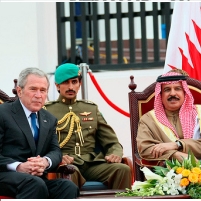U.S. Military vs. Human Rights in Bahrain
Wednesday, February 23, 2011
 George W. Bush with King Hamad bin Isa al-Khalifa of Bahrain (R)
George W. Bush with King Hamad bin Isa al-Khalifa of Bahrain (R)
For the U.S. government, strategic priorities have taken preeminence over human rights in Bahrain, where a substantial opposition movement by the Shiite majority is threatening to topple the long-ruling Sunni royal family.
Bahrain in one of only four countries in the world with a majority Shi’a population, and the only one in which the Shi’a are not in power. The others are Iran, Iraq and Azerbaijan.
Because the U.S. Navy’s Fifth Fleet is based at this island nation, located off the Arabian Peninsula in the Persian Gulf, American foreign policy has been devoted to maintaining strong relations with King Hamad bin Isa al-Khalifa. By remaining in Bahrain, the U.S. can guard the Strait of Hormuz, a vital shipping route for Middle Eastern oil, and protect its other interests in the region.
But remaining loyal to the king has meant ignoring allegations of human rights abuses endured by Shiites who have suffered discrimination in politics, employment and housing. That treatment has fueled the recent protests, including a march on Tuesday that numbered more than 100,000—a remarkable figure given Bahrain’s native population is barely half a million.
“The problem has been that we have been doing everything we can to cuddle up to the Khalifas and have been consciously ignoring at best the situation of Bahraini Shiites,” Gwenyth Todd, a former political adviser to the Navy in Bahrain, told The New York Times. “We could find ourselves in a very bad situation if the regime has to make major concessions to the Shia, unless we change our tone.” She related one case in which she was forced to use $30,000 of her own money to fulfill a Navy program to help poor Shiites after a Naval commanding officer reneged on the program because it would offend the royal family.
Nabil Rajab of the Bahrain Center for Human Rights added that the American military has always taken the side against human rights. “The U.S. did not build up any good relations with the opposition. They always categorize them as fundamentalist or extremist in their reports, in order to justify their political position in support of the government,” Rajab said.
-Noel Brinkerhoff
Dim View of U.S. Posture Toward Bahraini Shiites Is Described (by Michael Slackman, New York Times)
Bahrain Shiites Turn Out in Vast Protest (by Michael Slackman and J. David Goodman, New York Times)
- Top Stories
- Unusual News
- Where is the Money Going?
- Controversies
- U.S. and the World
- Appointments and Resignations
- Latest News
- Musk and Trump Fire Members of Congress
- Trump Calls for Violent Street Demonstrations Against Himself
- Trump Changes Name of Republican Party
- The 2024 Election By the Numbers
- Bashar al-Assad—The Fall of a Rabid AntiSemite






Comments